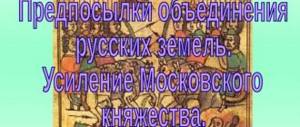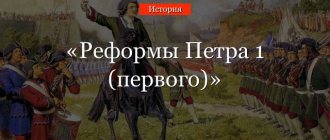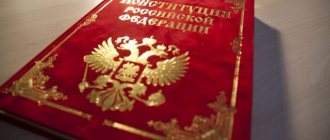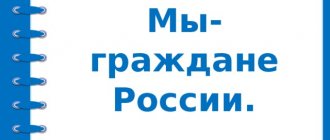Lesson notes for grade 8. history history lesson plan (8th grade) on the topic
Notes 45 history 8th grade etc. 29-30 Alexander’s internal policy3.
1. Personality of Alexander III.
He became heir to the throne in 1865 after the unexpected death of his older brother Nicholas. He was not prepared for the imperial crown, and he received the usual military education for grand dukes, but he was not able to fully master it. History was read to the heir by S. M. Solovyov, legal sciences by K. P. Pobedonostsev. After the death of his elder brother, the Tsarevich took his bride, the Danish princess Dagmara, or Maria Fedorovna in Orthodoxy, as his wife. They had three sons - Nikolai, Georgy, Mikhail and two daughters, Ksenia and Olga. Even before ascending the throne, he traveled all over Russia. He preferred to stay in the houses of ordinary people, had long conversations with people who had lived, who knew a lot about ancient customs and habits, and amazed his contemporaries with his simplicity and knowledge of folk life; and Russian (peasant) character.
Outwardly, he also resembled a peasant; he was overweight, which caused ridicule in the royal family. But his thick beard and almost always a military uniform gave his appearance a presence and solidity. He was distinguished by colossal physical strength: he easily broke horseshoes and bent silver rubles. In terms of state economy he was similar to Peter I, even his trousers were darned by an orderly. After the death of Alexander II, he began to fear terror.
(It is possible for a prepared student to report on the identity of the emperor).
Already on March 2, receiving the highest state dignitaries, the emperor emphasized that he was not deceived about the state of affairs in Russia, that he would not make any concessions and was ready to courageously face danger. He said: “I accept the crown with determination. I will try to follow my father and finish the work he started.”
Maybe the reforms will continue?!
2. The controversial nature of the beginning of the reign of Alexander III.
On March 8, 1881, a discussion of the Loris-Melikov project took place. Most of the dignitaries, in whose hands by the beginning of 1881 there was real power - Count Loris himself, the Minister of Internal Affairs, the Minister of Finance Abaza and the Minister of War D. A. Milyutin, spoke in favor of convening the representative office. It seemed that the mood of the meeting was determined when one of the minor dignitaries, a thin man with a dry, thin face, took the floor. “Pale as a sheet and obviously excited,” Fr. with surprise. Russia's troubles, according to the speaker, are generated by reforms. His speech lasted 10-15 minutes, but to some it seemed that it lasted an eternity. He proved, called, exposed. Now, the speaker exclaimed, addressing the king, they are offering us the establishment of a supreme talking shop, and when? “When on the other side of the Neva, just a stone’s throw from here, lies in the Peter and Paul Cathedral the still unburied ashes of the benevolent Russian Tsar, who was torn to pieces by Russian people in broad daylight!”
The meeting was stunned. For the first time, the “Great Reforms” were condemned. Their authors were accused of the death of Alexander II. “We all bear the stigma of indelible shame. We all must repent!” - the speaker shouted. And Alexander Sh unexpectedly responded: “The truth is, we are all to blame. I'm the first to blame myself!
Within weeks of March 8, the helm of the ship of state was turned 180 degrees. Just recently, the all-powerful Loris, Abaza, Milyutin received their resignations, and the man who spoke out against them on March 8 stood at the helm of power.
Who is he? The Tsar's longtime mentor, Chief Prosecutor of the Holy Synod, is Konstantin Petrovich Pobedonostsev. Since 1861, a professor at Moscow University, he was born into the family of a literature professor. A reserved office worker, he was unusually afraid of the chaos that a crowd unrestrained by a higher power could create. Invited to teach the heir to the throne, he moved from Moscow to St. Petersburg and devoted himself mainly to public service. Gentle, not even decisive in personal relationships, he was inexorably cruel in politics. When one of the theological seminaries was to be closed, in which riots occurred, and the local bishop begged Pobedonostsev to reverse this decision - it was winter, many students were in danger of starvation, a telegram came from St. Petersburg: “Let them die.”
Pobedonostsev tried to force people to be happy, kind and to subordinate their entire lives to orders. He was a prominent representative of conservatism, a keeper of traditions, opposed “all changes for the sake of the ideal of monarchy,” and believed that reforms would destroy Russia. His contemporaries called him the “Genius of Darkness” and “Grand Inquisitor”. It was he who became the author of the coronation manifesto of Alexander III. On April 29, 1881, the tsar published a manifesto that said: “In the midst of great sorrow, the eye of God commands us to take up the work of government, trusting in Divine providence, with faith in the power and truth of autocratic power, which we are called upon to affirm and protect...”
By dismissing Loris-Melikov and rejecting his project, the tsar took the first step towards reaction (resistance to progress).
N.P. Ignatiev became the new Minister of Internal Affairs, he began his activities by creating a special meeting, which received the right to exile suspects without trial for a period of 5 years, “Temporary Rules for the Press” appeared, as a result, all independent magazines were closed. At the same time, the new minister tried to develop Loris-Melikov’s ideas. In 1883, it was planned to convene a Zemsky Sobor consisting of 3,000 people elected from different classes. The opening was prepared for the coronation celebration. The Council, according to Ignatiev’s plan, was to develop proposals to combat the revolution. The Emperor sympathized with the project. However, Pobedonostsev again intervened in the matter. He argued that convening a council would be “the death of Russia.” Ignatiev was dismissed, and Dmitry Andreevich Tolstoy, who had previously carried out an unpopular school reform, was appointed in his place. For the sake of his career, the count was ready to do anything, and, naturally, was against any representation.
Since that time, the government has completely switched to conservatism and abandoned reforms. The government is trying to preserve and preserve the old order.
3. Social policy.
To pursue a new course, the tsar is trying to enlist the support of all segments of the population.
| Nobles | The king confirms their dominant role. In 1883, the Noble Bank was established, which issued preferential loans to nobles to preserve their estates. |
| Peasants | Redemption payments have been reduced and the capitation tax has been cancelled. But the problem of land shortage remained. Peasants were encouraged to be more thrifty; the Peasant Bank was established in 1882, but not all peasants could pay bank interest if they took out a loan. |
| Workers | In 1882, children under 12 years of age were banned; in 1885, night shifts for women were prohibited. But strikes were not allowed. Factory owners had every right to control life at their enterprises. |
Conclusion: The government is trying to extinguish contradictions and keep everything the same.
4. Counter-reforms of Alexander III.
With the advent of D.A. Tolstoy as Minister of Internal Affairs, all ministers who defended the reforms of Alexander II were dismissed, and a review of the reforms began, called counter-reforms.
Remember the main liberal reforms.
(the named reforms are written on the board):
- Judicial reform.
- Zemstvo reform.
- Reform in the field of education.
- Censorship reform.
All of the above reforms have undergone changes:
- Independence (autonomy of universities) was eliminated, state control extended not only to students, but also to teachers, the intelligentsia must be obedient to the tsar.
- In 1885, the Supreme Disciplinary Presence of senators was created, which received the right to remove judges at its discretion; trials began to be held behind closed doors. What principles are violated? (Irremovability and publicity)
- The pinnacle of the fight against reforms was the zemstvo counter-reform. The tasks performed by the zemstvos completely suited the tsar. What tasks did the zemstvos perform? (Work with text). The government was not satisfied with the social activity of the zemstvos, so the institution of zemstvo chiefs (from the nobility) was established; they could cancel any decision of the zemstvos, village assemblies, and the “Regulations on Zemstvo Institutions” completely deprived the zemstvos of independence.
- In 1887, a circular on “cook’s children” was adopted, prohibiting the admission of representatives of lower social classes to the gymnasium.
Conclusion: Alexander III managed to normalize the situation. But the calm was deceptive; the main problems were not resolved. In foreign policy, the tsar provided Russia with 1.5 decades of peace, which is why he was called a peacemaker.
IV. Primary control.
Checking the lesson plan.
In the square next to the description of these resolutions, put the number of the liberal reform (listed above) against which it is directed.
| 3 | Elimination of university autonomy |
| 2 | Establishment of the Institute of Zemstvo Chiefs |
| 1 | Establishment of the highest disciplinary presence |
| 2 | Adoption of the “Regulations on Zemstvo Institutions” |
| 3 | Circular about "cook's children" |
| 4 | Introduction of “temporary rules on the press” |
V. Consolidation.
Compose a historical portrait using the materials in the table, starting from the second point. The contents of the 3rd and 4th columns and rows of the table must be mixed up; students are tasked with bringing the table data into conformity.
| № | Comparison lines | Alexander III (1845-1894) | Pobedonostsev K. P. (1827-1907) |
| 1 | Characteristic features of the era | On March 1, Emperor Alexander II was assassinated in the center of St. Petersburg. Panic reigned in the capital. Revolution was expected any day now. One part of society is dissatisfied with the slowness of the reforms, while the other was afraid of them, considering them too bold. In this situation, a choice had to be made - whether a turn from centuries-old autocracy to representative government would begin. | |
| 2 | Career milestones | He became heir to the throne in 1865 after the death of his brother. In 1877-1878 participated in the Russian-Turkish war. On March 2, 1881 he ascended the throne. | Since 1861, he was a professor at Moscow University, an expert in civil law, and taught legal sciences to Alexander III. From 1880 to 1905 - Chief Prosecutor of the Holy Synod, author of the coronation manifesto of Alexander III. |
| 3 | Personality traits, appearance | He was distinguished by excellent health and colossal physical strength (he easily broke horseshoes). He was deeply religious and had a balanced character. He received a military education and was not particularly successful in his studies. | Thin, with a dry, ascetic face. Well-rounded, intelligent. A reserved office worker, an excellent critic. He tried to isolate himself from the outside world and lived for a long time in a monastery. |
| 4 | Means used to achieve goals | Revisiting the reforms of previous decades. | Blind denial of everything new in public and state life. |
| 5 | Performance results | He quickly normalized the situation in the country, but the calm was deceptive. He managed to keep Russia from getting involved in international conflicts, earning recognition as a peacemaker king. | He tried to put the complex state life of the late 19th century under the personal control of the emperor, but only undermined the administrative apparatus. His attempts to direct the life of society only by orders failed. |
| 6 | Contemporary assessment | “Baker on the throne”, “Peacemaker”, “owner of a large estate, solely responsible for everything.” | “Genius of Darkness”, “Grand Inquisitor”, “wild nightmare of Russian history”, “white revolutionary”. |
| 7 | Famous sayings | “Europe can wait while the Russian Tsar fishes.” "Constitution? So that the Russian Tsar would swear allegiance to some brutes?” | “Against any changes, for the sake of the ideal of the monarchy.” “So that everything remains the same.” Otherwise, Russia may have no future.” |
History - lessons, tests, presentations, notes
Create your teacher website PC and PPC courses Video lessons Olympiad Webinars for teachers
- home
- Story
Watch and download free lessons, tests, notes, presentations and other useful materials on history for teachers and students.
- All 13406
- Lessons 6096
- Presentations 2979
- Tests 757
- Planning 960
- Events 1003
- Other 1611
- All classes
- For preschoolers
- 1 class
- 2nd grade
- 3rd grade
- 4th grade
- 5th grade
- 6th grade
- 7th grade
- 8th grade
- 9th grade
- Grade 10
- Grade 11
| Open lesson in Memory "Feat of Stalingrad" Development of an open lesson dedicated to the "Feat of Stalingrad", which talks about its scale, role in the radical turning point during the Great Patriotic War, about the heroes whose feat... 03.24.2020 Kudrina Ekaterina Aleksandrovna 80 0 |
| The sacred source “Pentateuch (Torah)” The Holy Scripture of Judaism (Sfarim) is also known in Hebrew abbreviation as Tanakh ... 07/23/2020 Adkhamov Muzaffar Makhmudzhanovich 39 0 |
History of the Wusuns and their economy Lesson topic: History of the Wusuns and their economy. Presentation for a lesson on the history of Kazakhstan.... 05.24.2020 Kalauidenova Almagul Sabirovna 65 0 |
| Constitution of kunіne arnalgan makala Constitution of kunіne arnalgan makala. Ata zanymyz turaly malimetter berylgen… 08/27/2020 Asylgul Sagatzhanovna Kusmanova 35 0 |
| cordial. News ենալով բազմաթիվ posed by cordial 05.23.2020 Hovsepyan Suzanna Ashotovna 90 0 |
| Repetitive and generalizing lesson on the topic: “The world at the beginning of modern times” 7th grade This development offers a test consisting of two parts…. 05/28/2020 Malakhova Tatyana Petrovna 99 3 |
| Topic: “Nature and people of Ancient India.” India is located in South Asia. Its shores are washed by the Indian Ocean from the west, east and south. Find Mesopotamia on the map and determine in which direction (north, south) you need to move from Mesopotamia, ... 09.10.2020 Ibragimova Sakinat Alievna 31 0 |
| “The Babylonian king Hammurabi and his laws” The presentation was compiled for an open lesson on the history of the Ancient World. It contains 26 slides, fully complies with the requirements of the Federal State Educational Standard, tests knowledge on the map, chronology of events, historical ter... 08/11/2020 Dyadyuk Lyudmila Egorovna 75 0 |
| Presentation “Europe in the Early Middle Ages” presentation “Europe in the Early Middle Ages” introduces students to this topic in a visual form... 09.28.2020 Bolotova Olga Vasilievna 96 11 |
| “Web services in the work of a teacher” Education goes beyond the walls of the classroom, students can listen to lectures by the best teachers and famous scientists, and study remotely. The system for assessing student achievements is also changing. The rating is beyond... 03/17/2020 Sabitova Rimma Yadekarovna 86 0 |
| Presentation “The Beginning of the Second World War” presentation The Beginning of the Second World War, for a history lesson it is interesting and educational for children about the Second World War... 09.28.2020 Bolotova Olga Vasilievna 8 0 |
| Don region in the era of Peter the Great's reforms. Extracurricular work on the history of the Don region. Don region in the era of Peter's reforms.... 08/24/2020 Ivanova Nadezhda Aleksandrovna 31 0 |
“Imperialism and its signs” The mental map “Imperialism and its signs” is a reference outline for studying world history of the early 20th century. It briefly characterizes each of the signs of imperialism. ... 08/20/2020 Usacheva Anna Afanasyevna 47 0 |
| Birinchi jahon urushi This helps students to better understand the topic better… 04/06/2020 O'rinbaev Bahodir 89 0 |
| Armenian Highlands 05/08/2020 Hovsepyaan Dianna Ashotovna 72 0 |
| Day of National Unity Day of National Unity. gratitude for the help and intercession, Prince Dmitry Pozharsky, at his own expense, built a wooden… 09.22.2020 Soglasova S.M. 33 0 |
| An extra-curricular event for high school students “Days of Military Glory of Russia” to introduce students to the memorable dates of the military Glory of Russia... 08/26/2020 Oveshnikov Sergey Viktorovich 35 1 |
| Project on patriotic education “we are proud, we remember!”, dedicated to the 75th anniversary of the lifting of the siege of Leningrad. The work briefly summarizes the results of students in developing a project dedicated to the 75th anniversary of the lifting of the siege of Leningrad... 04/10/2020 PANKRATOVA EKATERINA ALEXANDROVNA 91 0 |
| Methodological development of an extracurricular event in history in the 5th grade “The Virtues of Confucius” The event is dedicated to the virtues of the Chinese sage Confucius and their significance in people’s lives. ... 06/15/2020 Samus Vladimir Anatolyevich 71 0 |
| Educational lesson dedicated to Victory Day in the Great Patriotic War on the topic: “Kazakhstanis on the fronts of the Great Patriotic War” (1941-1945) Fostering Kazakh patriotism, respect for the heroic past of their people…. 04/25/2020 Ilyasova Perezat Malikovna 98 0 |
- ← Back
- Continue →





